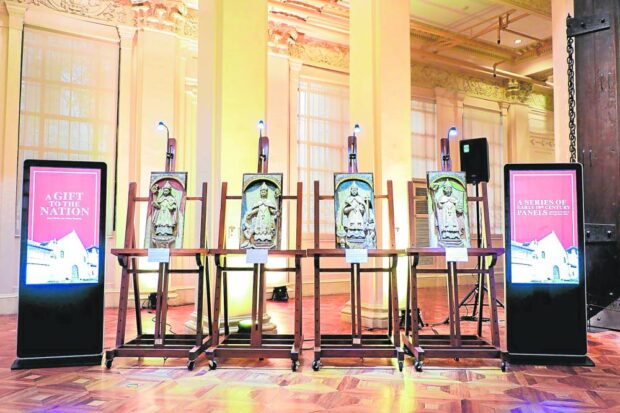
FROMOLD PULPIT The National Museum of the Philippines received a series of early 19th-century panels depicting the founder of the Augustinian Order as a gift from private collectors on Feb. 13. The panels came from the pulpit of the Patrocinio de Maria Santisima Parish Church in Boljoon, Cebu. Leaders of the Archdiocese of Cebu and the provincial government, however, are asking the National Museum to return the panels, said to be stolen and lost for four decades, to the church.
—NATIONAL MUSEUM OF THE PHILIPPINES
CEBU CITY—The Archdiocese of Cebu wants the stolen pulpit panels from the centuries-old church in Boljoon town returned to the parish and its community—a resolution different from the proposal of the National Museum of the Philippines (NMP) to “share” them with the people of Cebu.
Cebu Archbishop Jose Palma insisted that the four long-lost pulpit panels from the Archdiocesan Shrine of Patrocinio de Maria Santisima in Boljoon were not artworks, but important in the “ecclesial rite as tools of evangelization.”
“While we understand the National Museum’s desire to exhibit the same to the general public, we have to assert the sacral nature of these panels. They are integral to the patrimony of the church as part of her missionary work and thus considered sacred. Their illegal removal constitutes a sacrilege,” Palma said in a statement on Tuesday.
“They should never have been treated, then or now, as mere artworks for exhibition in museums, much less for private appreciation by the collectors who purchased them,” he added. “Given the foregoing, the Archdiocese of Cebu hereby asserts its ownership of these panels and requests their immediate return to Boljoon at the pulpit where they were surreptitiously removed.”
Lost since 1980s
The 19th century panels were lost in the late 1980s and only resurfaced 40 years later later on Feb. 13 at the NMP’s National Fine Arts Collection in Manila, after they were donated by private collectors Edwin Bautista, the president and CEO of Union Bank, and his wife Aileen.
The four looted panels—depicting the images of St. Augustine of Hippo, St. Cyril of Alexandria and St. Ambrose of Milan—were part of the five panels at the pulpit of the Boljoon church. Only the panel of St. Leo the Great remained in the church.
According to Palma, the four panels were “removed without permission” from the church during the time of his predecessor, the late Ricardo Cardinal Vidal, who served as Cebu archbishop from 1982 to 2010.
“No official record exists neither in the Archdiocesan Archives nor in the Chancery Office of any request from the parish priest at the time, Fr. Faustino Cortes, requesting approval to deconsecrate them for removal, much less conveyance to third parties in exchange for monetary purposes of the parish,” the prelate noted.
‘Ethical acquisition’
In a statement on Monday, the NMP did say how the Bautista couple got hold of the panels, but it noted that “our donors procured these specific panels through legitimate means, highlighting their commitment to ethical acquisition.”
It added that their decision to acquire these artifacts and donate them to the NMP “reflects their dedication to preserving cultural heritage and promoting patriotism.”
READ: Cebu seeks return of historic church pulpit panels from National Museum
The NMP said it would engage in a “constructive dialogue” with Cebu Gov. Gwendolyn Garcia, Boljoon Mayor Jojie Derama, Archbishop Palma, and the community of Boljoon to “facilitate sharing the four panels with the people of Cebu as soon as possible.”
“[In] order to prioritize the welfare of these panels, we will continue to pursue preventive conservation measures necessary to prepare them for public display in due course. This demonstrates our steadfast dedication to fostering understanding, appreciation, and access to our rich cultural heritage for all Filipinos,” it added.
The Cebu provincial board passed a resolution urging the NMP to return the pulpit panels to Cebu.
Garcia and Derama vowed to help the archdiocese and the Boljoon parish in safeguarding church property.
“I believe we have the same goal and that is to honor these treasures from the past. But more than honoring them, we must also honor where they came from. If they’re a part and parcel of the history, the heritage, and the pride of Cebu and the Cebuanos, then we request the National Museum to return these treasures so that they may be rightfully put back where they belong,” Garcia said.